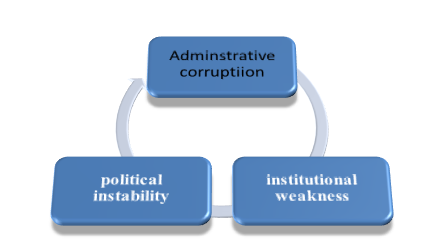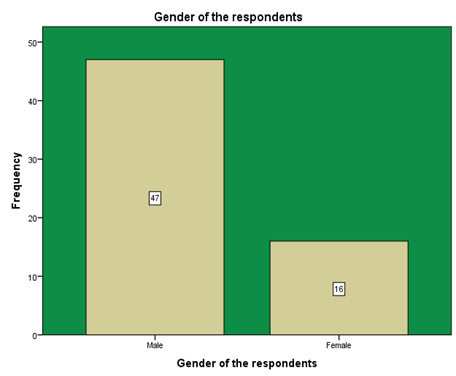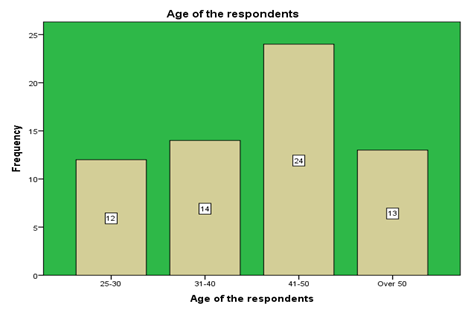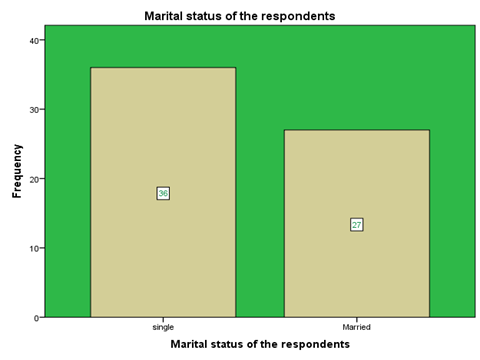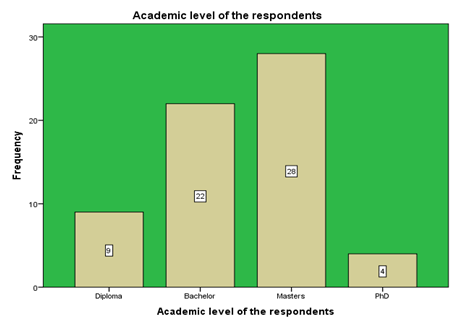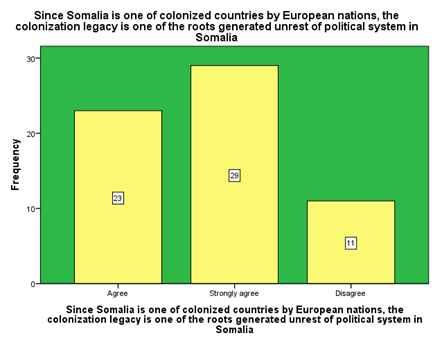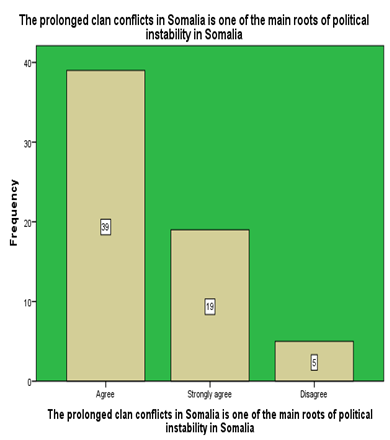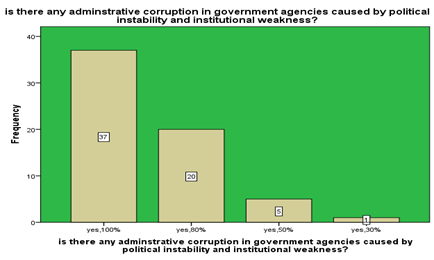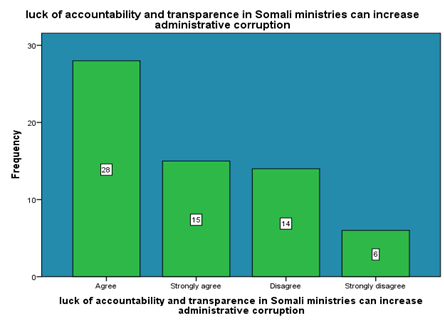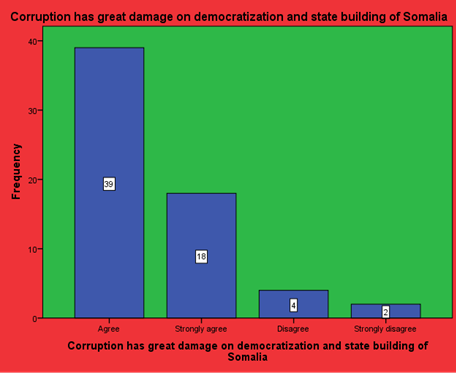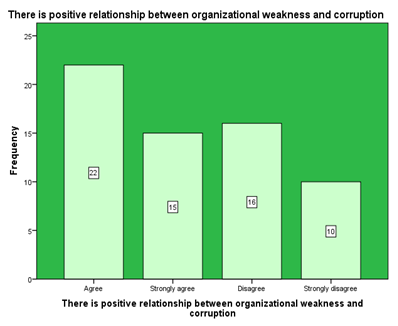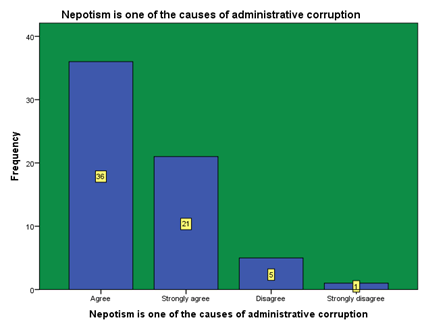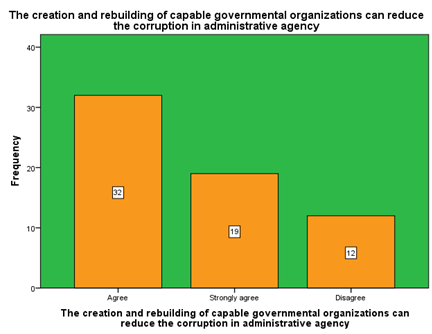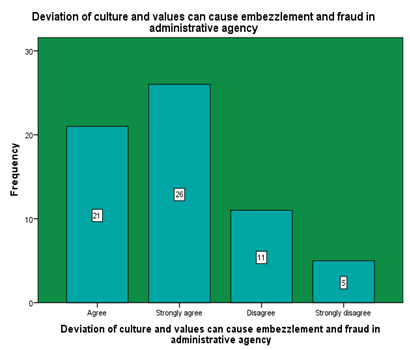Political Instability and Institutional Weakness: A Study of Administrative Corruption in Mogadishu-Somalia’’.
- Abas Omar Hassan
- 1676-1689
- Oct 18, 2023
- Political Science
Political Instability and Institutional Weakness: A Study of Administrative Corruption in Mogadishu-Somalia’’.
Abas Omar Hassan
Capital university
DOI: https://dx.doi.org/10.47772/IJRISS.2023.71035
Received: 31 August 2023; Revised: 08 September 2023; Accepted: 18 September 2023; Published: 18 October 2023
ABSTRACT
The study examined political instability and institutional weakness taking cognize of the administrative corruption in Mogadishu-Somali, Even though there are valued literatures on areas of corruption in relevance with political instability and the mediator of institutional weakness as political and administrative corruption, this I have cited a lot of valuable papers that have examined the determinants of administrative corruption. The focus of the study was to examine the effect of political instability and in tuitional weakness on administrative corruption in Mogadishu-Somalia, the case study was generally concerned public institutions, especially ministry of finance, ministry commerce and the ministry of educations. We test a sample of 63 responses from the different civil society organizations, academic scholars, business men, political analysts and other seniors in Mogadishu –Somalia. The representatives as perspective of the general public Mogadishu-Somalia shared with us remarkable responses concerned to the questions we asked them. Findings indicated that the political instability and institutional weakness of public organizations completely effected and have direct cause on administrative corruption exist in Mogadishu-Somalia, both of political instability and institutional weakness caused the administrative corruption in our country. Institutional weakness arbitrates the impact of political instability on administrative corruption. Therefore, political instability is a crucial factor causing corruption since it has both direct and indirect effects on administrative corruption. The research design that preferred to use in my study is descriptive research design, especially I chose to use questioner as the tool to collect date since I planned to use primary data, the theoretical contributions, managerial implications, limitations, and recommendations for further research are provided in the conclusions and recommendations.
INTRODUCTION
The study consists of different topics that covered in deeply for the main sub-contents such as Research Objectives, Methodology, Findings and Discussions, Conclusion, Recommendations and References , the topics mainly search, indicate analyze, conclude and give directives of suggestions for the case of administrative corruption ,Corruption is one of the most note worthy obstacles to political stability and economic development globally. Especially third world countries, according the rate of corruption For More than 70% in the world suffer from that point of corruption. Denmark and New Zealand scored 90 (on a scale in which 100 indicates very clean, and 0 highly corrupt) in 2016 and graded first in the world, while Iraq and Venezuela and Somalia recorded as lowest a ranked out of 176 countries. Many more countries have become more corrupted according when compared with previous corruption index measures (Transparency International, 2018). Therefore, corruption is a universally challenging issue.(Salem A. Al-Jundi, Ahmed Shuhaiber and Shaban Alemara, 2022).
Political corruption is the most difficult one made by politicians’ operation of policies, public entities, and entirely governmental procedures in public investment , public employment, public policies to remain in power and rise prosperity and wealth, while corporate corruption indicates the privet corrupt practices made by private entities , including subornation, fraud, cartels, and corrupt nexus with governmental offices (Transparency International(Salem A. Al-Jundi, Ahmed Shuhaiber and Shaban Alemara, 2022).Corrupt public employees, who offer goods and services to the general public, abuse their administrative positions in public administrations for their personal interest; according to Transparency International, They halted commandments of laws and rules through activities such as, embezzlement, bribery, nepotism, and conspiracy between government departments and the private sector or what is called public privet partnership.
This study aims to study the effect of Political Instability and Institutional Weakness: A Study of Administrative Corruption in Mogadishu-Somalia’ ’as the effort to determine the main role of the Political Instability and Institutional Weakness on administrative corruption in Mogadishu- Somalia. First political instability weakness the power and the ability of the government and entirely public institutions to fight the corruption, this political instability can create conflicts between parties and sects that eventually weakness the public policies designed to fight the corruption , secondly when the public policies designed to fight corruption then organizational weakness result administrative corruption among the government agencies .
RESEARCH OBJECTIVES
1: The main objective of this study to examine the effect of political instability on administrative corruption.
2: The study is to examine effect of institutional weakness on administrative corruption.
3: The last of objective of research is to study level of corruption in Mogadishu -Somalia caused by political instability and organizational weakness.
THEORETICAL FRAME WORK
Administrative Corruption and Political Instability: Political scientists have different views on the phenomenon of political instability. Firstly, it has been suggested to rise when the government cannot easily process projects via the legislative or lawmaker’s assembly due to a struggle among parties, a second cause has been cited as conflicts that arise between parties and sectarians in which the government is unable to effectively fight corruption and improve infrastructures. Third, political instability has been said to result from a democratic conversion connected with civil war and sectional tensions(Salem A. Al-Jundi, Shaban Alemara and Ahmed Shuhaiber, 20222).
3.1 Political Instability and Institutional Weakness
Political variability damages the community sector because appointments are contingent on favoritism and party-political and cultural ties. Political instability lowers commercial development, denigrates the money, and decreases foreign direct investment inflows and. During conflicts, institutional leaders are more interested in increasing their political power and making private gains than in building a suitable administrative construction and refining the level of fulfillment among their assistants and trades. Stated that the provisional period from an autocratic regime to a self-governing or democratic one is related with weaker domination and increased exploiting from public reserves. Hence, we imagine that Political instability positively effects institutional weakness(Salem A. Al-Jundi, Shaban Alemara and Ahmed Shuhaiber, 20222).
3.2 Administrative Corruption and Institutional Weakness
Corruption rises in under-developed and developing countries due to the feebleness or weakness of the governmental administrative systems. For example, lack of accountability is responsible for the mismanagement and misuse of the public revenue for private gains. Additionally, low levels of public salaries and displeasure or dissatisfaction among public employees can contribute the level of corruption. Organized criminalities or the crimes and drug trading in black markets are results of institutional weakness and the failure of public administrations to submit with the law. Examples of institutional weakness include public sector appointments relying more on relations, bribery, and partiality \nepotism than on real experiences and fair processes. And determined police misconduct due to poor control instruments, including a lack of judicial oversight, low morals of conduct, and the nonappearance of suitable strategies(Salem A. Al-Jundi, Shaban Alemara and Ahmed Shuhaiber, 20222).
LITERATURE REVIEW
In general, Corruption is hopeless in motivating economic progress or development, increases public spending and inflation and it has a negative impact on bank efficiency. Similarly corruption is unscrupulous thing to government effectiveness, positively distresses bank efficiency. For instance If citizens are exploited by public staffs, they will be heartened to disruption laws and public rules. Exploitation is powered by war, inner conflicts, and terrorism (Transparency International, 2018). For the reason that of corruption, the charge of new arrangements in the public and private sectors increases exponentially. Corruption weakens marketplace efficiencies and the development of organization.(Salem A. Al-Jundi, Ahmed Shuhaiber and Shaban Alemara, 2022)Moreover, it growths income dissimilarity and poverty (Tebaldi & Mohan, 2010).according to the most corrupted countries , society are classes in economically, some people are more rich and others are under the poverty line, When the administrative exploitation increase scan cause the risk and uncertainty of commercial ventures and damages commercial endeavors ,public suggested that a minimal degree of corruption should be accepted in assessment systems when officials’ wages are little and public obligations cannot be predicted simply. Found that social acceptance, institutional weakness, and community employees’ insatiability are causes of corruption. Furthermore, that the interaction and relationship between government sections and the private segment generate corruption, particularly when the electronic government and citizen engagement are weak(Salem A. Al-Jundi1, 2022).
The World Bank report April 2015 based on the Millennium Development Goals (MDGs) has discovered that poverty has been declining in all over the world with that exception of most African countries. This report indicate that the line of poverty is degreasing in all over the world except African countries , According to the story or narrative , about 45% of countries in the sub-Saharan African countries are still expressively off-track from reaching the MDGs extreme poverty target of sharing poverty by 2015 from 1990.(DEVELOPMENT, 2015)
Political geniuses have divergent interpretations on the portent of political instability. First, it has been postulated to arise when the government cannot easily process projects via the parliamentary council due to a struggle among parties, Political instability and terrorism, corruption can unhelpfully affect a country’s tourism industry as discovered by the tourism literature. Das argued that if a nation performs corruption and deceitful business repetition, this can depreciate its social and national image and hamper its tourism attractiveness. Moreover, political discrepancy arising from the continuous change of administrations could raise the cost of doing occupational in corrupted states and cause barriers for investments in tourism (GHIALY YAP AND SHRABANI SAHA, 2013). Although there is ample indication of its impacts, the financial properties of corruption, particularly on development, endure to be a controversial topic in the literature. In this regard, the literature has proposed two different suggestions: sandpapering the wheels vs. lubricating the wheels. While the former settles such instinctive undesirable growth impressions, the latter proposes that dishonesty can have some confident impacts on the budget by evading awkward bureaucratic guidelines (Hany Abdel-Latif, Ayat Mohamed and Hanaa Elgohari , 2019). The concept or idea of good supremacy is perceptible to S.P Huntington’s proclamation in the late 1970s as the “third wave of democratization”. In the contemporary time, the longing for good governance is unparalleled. The protracted histories of most African countries predominantly Nigeria, have been that of brutal totalitarianism, especially military accident in politics(OLOGBENLA, 2007).Corruption is endogenous to many political assemblies and obliges key meanings beyond the self-interest of public administrators and politicians. Like violence, corruption participates in political ordering and, although corruption may in itself play a starring role on economies and rule-based institutes, it forms part of the fabric of social relations. This endogenous character means that conflicts may arise more from changes in the pattern of corruption, than from corruption itself(Billon, 2001).Political instability has been recognized to represent considerable tests to elating the landmass from its poverty tragedy. According to the North Africa, the Arab Spring of 2011 is still applying large negative externalities in terms of political instability and the wide spread corruption. The recent indication of these inclinations can be abridged in seven main points. First, in the time of Gaddafi, Libya has become a unsuccessful or failed state, categorized by comprehensive societal collapse and anarchy, with a overabundance of rebellious factions and two competing governments fighting greatly to command the law of the land. In Kenya the 2013 Westgate shopping mall and 2015 Garissa university killings in Kenya by Al-Shabab have revealed that the Somali Al-Quaeda affiliated Al-Shabab can still impose substantial political instability challenges in some African countries that caused that public institutions are suffering from administrative corruption caused by political instability and institutional weakness(DEVELOPMENT, 2015).Corruption is untruthful or illegitimate behavior particularly by government administrators. It is damage of truthfulness, virtue or moral attitude which involves parting from the innovative or from what is uncontaminated and correct. It is an encouragement to wrong by inappropriate or illegitimate means such as inducement. Exploitation is said to have demonstrated through deception, appropriation and embezzlement of communal funds, sexual annoyance inflation of agreements and others. World Bank (1998) defined dishonesty as the “use of community office for private gain” which includes inducement and pressure between two gatherings. According to Nye (1967), corruption is that performance which diverges from the proper duties of a public role since of private (gains) regarding individual, private group, close family, monetary or state gain or corruption is that performance which disturbs rule in contradiction of the bodybuilding of sure types of duties for secluded gains concerning influence and such performance includes inducement, favoritism and misuse (Adefeso, Hammed, 2018). Corruption seems as one of the most discussed points in the literature. In this respect, two challenging suggestions clarify this effect. The first is that corruption has a negative (sands the wheels) effect on speculation. They entitlement that corruption is a disheartening feature that clues to higher costs of manufacture, poor distribution of resources, and developed duties of poverty. The founded work of Mauro (1995) has described initial evidence on the undesirable relationship between exploitation and speculation using outdoor data(Gharaibeh, 2022).
In the republic of Tunisia, after the link of political manslaughters and assassinations that have characterized the post-Arab Spring era, the newly democratically elected government is now opposite a wave of attacks from Islamic fundamentalists, namely, the: Sousse and Bardo National Museum attacks in June and March 2015 respectively. Fourth, the Boko Haram of Nigeria is presently spreading its sphere of violence to neighboring countries like Niger, Cameroon, and Chad. According to Burundi, a pronouncement decision by President Pierre to run for a third term in bureau or office has cast a shadow of political violence/unpredictability across the country. In the South Sudanese political disaster and civil war which instigated in December 2013 has caused to thousands of death and exiled or displaced hundreds of thousands of south Sudan citizens in the country. And even 2015 political instability in the Central African Republic is not very different from experiences in the past these all events that can cause the political instability the most African countries cannot reach the potential millennium goals of united nation development of 2015.(DEVELOPMENT, 2015).Even though there is a common consensus about the status of transparence is important for financial development and social development of both public and private sector, the effect of corruption on exports, imports and administrative agencies is very critical for entirely development and growth. The literature provides arguments s regarding the relationship between political instability and corruption: the “grease” view and the “sand” view. While the “grease” view suggests a positive relationship between political instability and corruption in import, exports system and entirely administrative “This proposes that some contingency variables may affect this relationship and make the impact of corruption on exports either positive or negative). Because the role of mediators in export studies remains under-researched, this study reflects the impact of corruption on exports in the presence of two regulating variables, namely, the political instability and the corruption in the state. To the best of the authors’ knowledge, the combined effect of these official variables on the disseminates of firms has not been studied in previous research. In this study we will also discover the effect of government size and transparence in the sector sector of activity on the studied relationships. Additional specifically, the commentary focuses on small- and medium-sized enterprises (SMEs) in Tunisia, a North African country whose financial situation has knowingly worsened since the Arab Spring in 2010, and where SMEs are harassed to preserve their activities. There is a common agreement that SMEs play a major role in the budget by generating job opportunities and encouraging attractiveness through invention and free enterprise (Omer et al., 2015), and that their impact is even more significant in developing countries, where joblessness rates are high and the need to generate growth occasions is more important. The relationship between corruption and political instability at the firm level in African republics, however, leftovers under researched. By investigative the direct and competent impact of political instability and corruption in export goods in Tunisian SMEs, This study donates to the literature in two ways. First, it expands the mounting literature on the penalties of corruption on the universal activities of SMEs in developing countries(Entrepreneurial Finance Teluq, 2020). It is mostly argued that political instability and corruption encourage socially sub-optimal governmental policies and procedures, with possibly large contrary effects on social welfare. Experiential indication on the properties of political instability and corruption on speculation and growth also recommend that this is the case (on political instability and *Corresponding author growth, Up to now, though, the two writings have advanced in a parallel fashion. The communication between exploitation and political instability, and in precise their joint effects on policy development, has not been 1 lectured. In this paper we make an effort to reduce this gap in the literature. We chose to study the willpower of conservational policy. We believe there are several compensations to using conservational policy as an sample in a study of 2 the effects of political instability and corruption on policy formation. First, conservational policy making is likely to be demonstrative of many other forms of government policymaking. Exceptional interests encouragement environmental policy at the expense of the constituency’s interests, similar to other policies. Thus, our results are likely not to be exclusive for environmental policy-making, but have more general applicability second; a like-minded index of environmental policies facing farming sector producers was fashioned for the 1992 United Nations Conference on Environment and Development (UNCED, 1992). This belief brands it forthright in the empirical work to classify the fundamental relations between exploitation, party-political instability, and policy manufacture. Our philosophy shapes on the classical of trade strategy willpower by Grossman and 1 there is by now a independently large works on the relationship between political instability and macroeconomic policy formation(Per G. Fredriksson , Jakob Svensson, 2002).Corruption may have a negative impact on FDI inflow in countries with high levels of political instability and thus acts as a grabbing hand to FDI, whereas corruption may act as a helping hand factor in those countries with a high degree of political stability (Touny, 2016). for private gains, noted that exploitation persists in the mainland as long as a large quantity of the population contains in it and less benefit goes to the few straight Africans. The problematic persists in the landmass as long as the governance system committed by despots and the system remainders weak without recognized checks and stabilities (Arega Shumetie1* and Mulugeta Damie Watabaji2, 2019).In the interpretation of many researchers, invention refers operation of new or knowingly enhanced goods, services, process, promotion and association methods, and/or the blend of any of these by initiatives to gain competitive advantages. It contains the overview of new production or chief development made to the present foodstuffs/services to meet active customers’ demands. Invention in spires financial development and theaters a key character that overlays the procedure for the expansion of most republics in the world, Productivity, employ rate, and yearly sales development tend to be reliably higher for countries with more trendsetters, invention promises initiatives’ success in both emergent and industrialized countries as it arouses attractiveness (Touny, 2016).
METHODOLOGY
According to my study, researcher used one of the most useful tools in data designed to collect the data, since this study will cover and examine a lot of loop holes and cover research gaps the researcher used descriptive research design , and method used is quantitative method, the tool that used for data collection was questioner which is easily suitable for the availability of data , especially, researcher shared a questioner to all participants so as find out deep and reliable data which is significantly sufficient and steadfastly satisfied, quantitative method is very useful for all graduates and every researcher , because the data is easily be collected for the date is needed , according to the study the researcher targeted for civil society organizations , civil servants and other seniors in Mogadishu Somalia, so as find out the exact result the researcher would preferred it, the researcher wanted that this research will inform for at least 100 representatives from the different civil society organizations and seniors in Mogadishu –Somalia, according to the population of 100 , the researcher selected 63 of them to participate the questioner , the researcher have taken for result in what the these participant`s response.
DATA ANALYSIS AND INTERPRETATION
According to the above charter indicates that the gender respondents were 63 at all ,47% of the respondents were male and 16%of the respondents were female, thus the study indicated that the most of participants of my research were male.
According to the above charter indicates that age of the respondents were as follows, the respondents were 63 at all, 25-30 were 12, 31-40 were 14 ,41-50 were 24 and over 50 were, thus the study indicated that the most of participants of my research were the age of 41-50.
According to the above charter indicates that the marital status of the respondents were as follows, the respondents were 63 at all , 36 of the respondents were single and 27 of respondents were married, thus the study indicated that the most of participants of my research were single as marital status.
According to the above charter indicates that the academic level of the respondents were as follows, the respondents were 63 at all, 9 of the respondents were Diploma, 22 of the respondents were Bachelor, 28 of the respondents were masters and 4 of the respondents were PhD, thus the study indicated that the most of participants of my research were the master degree.
According to the to question (1) charter above indicates that the respondents were 63 at all, 23 of the respondents answered Agree, 29 of the respondents answered strongly agree and 11 of the respondents answered disagree, thus the study indicated that the most of participants of my research answered strongly agree.
According to the to question (2) charter above indicates that the respondents were 63 at all, 39 of the respondents answered Agree, 19 of the respondents answered strongly agree and 5 of the respondents answered disagree, thus the study indicated that the most of participants of my research answered Agree.
According to the question (3) charter above indicates that the respondents were 63 at all, 37of the respondents answered yes,100%, 20 of the respondents answered yes,80%, 5 of the respondents answered yes,50% and 1 of respondents answered yes,30%, thus the respondents indicated that the most of participants of my research answered yes,100%.
According to the question (4) charter above indicates that the respondents were 63 at all, 28 of the respondents answered Agree, 15 of the respondents answered strongly agree, 14 of the respondents answered disagree and 6 of respondents were answered strongly disagree, thus the study indicated that the most of participants of my research answered agree.
According to the question (5) charter above indicates that the respondents were 63 at all, 39of the respondents answered Agree, 18 of the respondents answered strongly agree, 4 of the respondents answered disagree and 2 of respondents were answered strongly disagree, thus the study indicated that the most of participants of my research answered agree .
According to the question (6) charter above indicates that the respondents were 63 at all, 22 of the respondents answered Agree, 15 of the respondents answered strongly agree, 16 of the respondents answered disagree and 10 of respondents were answered strongly disagree, thus the study indicated that the most of participants of my research answered agree.
According to the question (7) charter above indicates that the respondents were 63 at all, 36 of the respondents answered Agree, 21 of the respondents answered strongly agree, 5 of the respondents answered disagree and 1 of respondents were answered strongly disagree, thus the study indicated that the most of participants of my research answered agree .
According to the question (8) charter above indicates that the respondents were 63 at all, 32 of the respondents answered Agree, 19 of the respondents answered strongly agree, and 12 of the respondents answered disagree and, thus the study indicated that the most of participants of my research answered agree .
According to the question (9) charter above indicates that the respondents were 63 at all, 21 of the respondents answered Agree, 26 of the respondents answered strongly agree, 11 of the respondents answered disagree and 5 of the respondents answer strongly disagree, thus the study indicated that the most of participants of my research answered strongly agree.
FINDINGS AND DISCUSSION
The main purpose of my research was to examine the effect Political Instability and Institutional Weakness: A Study of Administrative Corruption in Mogadishu-Somalia’’, as the researcher told in the research methodology the researcher prepared a questioner and shared with 63 participants in Mogadishu-Somalia including civil society organizations( business men , reporters and scholars ),civil servants and other seniors including politicians, political actors and pressure groups , as the result indicated, respondents indicated that political instability and political weakness have direct effect on administrative corruption in Mogadishu-Somalia, hence the main research objective that the researcher wanted to know was achieved , during this study the researcher achieved two important results: fist the researcher known that political instability and administrative corruption effect directly to the administrative corruption, second the researcher achieved the main objective that is that I have known the main administrative corruption exist in Somalia government agencies was caused by the political instability and institutional weakness my conclusion, the searcher finally found that the political instability and institutional weakness of public organizations positively affect administrative corruption, while political in stability causes institutional weakness. The latter mediates the effect of political instability on administrative corruption. Lastly we my study that both political instability and organizational weakness are the crucial factors affecting corruption meanwhile it has direct and impact on administrative corruption.
CONCLUSION
The end of the study concluded the findings or the result of the study, during the study the researcher found main research of objectives the study concerned, the study focused the to find out the effect of political instability and institutional weakness: A study administrative corruption in the Mogadishu –Somalia, this case was very attractive case that is currently suitable and needed to search, after the researcher combined, summarized the collected questioner from 63 respondents from different sectors of both privet and public sector, First the study indicated and found that the political instability exist in Somalia caused the administrative corruption in Mogadishu –Somalia, specially the larger rate of corruption in the executive branches of the government, such as highest offices and ministries administered by public officials and politicians who deviated from the way transparent .Second: the study indicated and found that the institutional weakness exist in Somalia generated vulnerability and failure to enact laws and systems of electronic system government to help luck of laws and policies caused administrative corruption, such as nepotism ,favoritism, unequal employment of public employment opportunities and luck of transparent. Lastly the study found and indicated that the political instability and institutional weakness caused obviously and surely the administrative corruption exist in the government agencies in Mogadishu-Somalia. Finally the study showed officially that the researcher achieved the result that is applicable to the research objectives of the study of the variables and case at all.
RECOMMENDATIONS
The study tested the proposed remarkable recommendations, for entirely of administrative agencies of the federal republic of Somalia and every scholar or researcher who wants to be administrative member of Somali federal government
1: The study suggested to the government of Somalia to rebuild the capability of the public agencies and make absolute laws to prevent the larger rate of corruption interrupted our system of governance.
2: The study would recommend to our government especially for administrative agencies such as executives and commissioners of the local government to keep track of deeply with the stability and transparency of their operations.
3: The study proposes for the government of Somalia to establish and reform the structure of the movement and have set basic laws for entirely state to far away from any kind of corruption especially administrative corruption.
4: The study suggest for the government branches of the government to far away from the corruption, because the corruption destruct and damages the system of governance and the everything will be scarce.
5: Lastly I would propose for Somali citizens to work with government and inform any public loop hole and any kind which can bring political instability and weakness for our government and the government must create collaboration platform between Somali citizens and the government of Somalia.
REFERENCES
- Adefeso, Hammed. (2018). Corruption, Political Instability and developmet nexus in africa . Munich Personal RePEc Archive, 16.
- Arega Shumetie1* and Mulugeta Damie Watabaji2. (2019). Effect of corruption and political instability on enterprises’ innovativeness in Ethiopia:. Journal of Innovation and, 19.
- Billon, P. L. (2001). The role of corruption in conflicts. WIDER Discussion Jornal, 24.
- Developmnt, A. G. (2015). Political Stability, Corruption and . jacinta.nwachukwu@coventry.ac.uk, 16.
- Entrepreneurial Finance Teluq, U. o. (2020). The impact of corruption on the export intensity of SMEs in Tunisia: moderating effects of political instability and regulatory obstacles. Moujib Bahri, 18.
- Gharaibeh, O. K. (2022). “Corruption, political instability and their impact on investment. “Investment Management and Financial Innovations jornal, 15.
- Ghlaly yap and shrabanisaha .(2013).Do political instability ,terrorism nad corruption have deterring effects on our tourism development in the . Printed in the USA. All rights reserved., 13.
- Hany Abdel-Latif, Ayat Mohamed and Hanaa Elgohari . (2019). Corruption, political instability and growth: Evidence from the Arab . Editor of Online Journal, 21.
- Ologbenla ,D.K(2007). Leadership, Governance and Corruption in Nigeria . Journal of Sustainable Development in Africa (Volume 9, No.3, 2007), 22.
- Per G. Fredriksson , Jakob Svensson. (2002). Political instability, corruption and policy formation: the. Journal of Public Economics, 23.
- Salem A. Al-Jundi,Ahmed Shuhaiber and Shaban Alemara. (2022). The Effect of Political Instability and Institutional . Article in Contemporary Economics · June 2022, 15.
- Salem A. Al-Jundi,Shaban Alemara and Ahmed Shuhaiber. (20222). he Effect of Political Instability and Institutional Weakness on Administrative Corruption. Contemporary Economics, 15.
- Salem A. Al-Jundi1. (2022). Effect of political instability and institutional weakness on adminstrative corruption . JEL Classification:, 15.
- Touny, M. A. (2016). The interactive effects of corruption and political instability on foreign direct investment: evidence . Int. J. Trade and Global Markets, 16.


